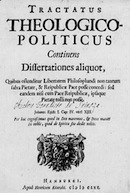
Source: Theologico-Political Treatise - Chapter V - of the ceremonial law
Spinoza's Chapter 5 – on the origin of ceremonial law - but laws are best made by the governed (Page 3)

Spinoza concludes that either government should be in the hands of the people governed or a very special person. (the philosopher king of Plato?) Additionally, laws should be directed toward some desired good that people want and they should be made by common consent and never imposed by fear of punishment. People would then willingly obey them. In such a society people would remain free.
Spinoza goes on to examine the laws as formulated in the kingdom of the Jews when they left captivity in Egypt. He says they had only slave mentality and were not fit for self government therefore sovereignty became invested in Moses. Moses introduced a religion and ceremonies to bind them together so that they would be as one people out of their devotion.
In his own words – This, then, was the object of the ceremonial law, that men should do nothing of their own free will, but should always act under external authority, and should continually confess by their actions and thoughts that they were not their own masters, but were entirely under the control of others. Ceremonial law has nothing to do with blessedeness.